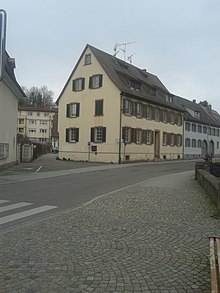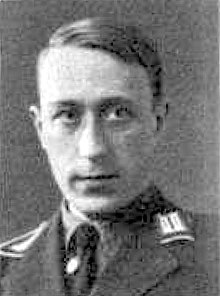Theo Rehm
Emil Theophil Rehm , called Theo Rehm (born November 29, 1896 in Nettur near Thalassery , British India , † March 18, 1970 in Emmendingen ), was a German Protestant theologian, dentist and politician ( NSDAP ).
Live and act
Rehm's father, a bookseller from Emmendingen, was a missionary for the Basel Mission on the Malabar Coast in British India when his third son Emil Theophil was born . The son grew up with an uncle in Karlsruhe from the age of two . In 1898 the parents returned to Germany; In 1903 the family moved from Karlsruhe to Kassel , where Rehm continued attending elementary school and then switched to high school . From 1911 Rehm's father worked for the von Bodelschwingh Foundation Bethel . The gymnasium local left Rehm due to poor school performance, and attended from 1913 the grammar school ofKorntal Brethren .
Because of the First World War , Rehm broke off school attendance in the Obersekunda in 1915 ; he was awarded the university entrance qualification in 1917. Initially deployed in the 7th Thuringian Infantry Regiment No. 96 , Rehm reported in November 1916 to the Machine-Rifle-Sniper-Department No. 34, with which he was deployed on the Eastern and Western Fronts. In January 1919, Rehm was demobilized with the rank of lieutenant .
In February 1919, Rehm began studying Protestant theology at the University of Münster , which he continued at the theological school in Bethel and Halle and graduated in Heidelberg in 1922 . He married in August 1922.
From 1922 Rehm was vicar at the city church Emmendingen. At the same time he was Grand Master of the Hochberg Brotherhood of the Young German Order . Rehm's work as a religion teacher in Emmendingen resulted in two complaints from the local Jewish community in which he was accused of religious hatred and serious insult to the Jews and Judaism . In a sermon in March 1924 during the Hitler trial , Rehm compared the participants in the Hitler putsch with Jesus as the savior. The upper church council of the Evangelical Church in Baden criticized the sermon, "To put the putsch on the same level with the sinner-seeking love of Jesus, should arouse alienation far beyond the circle of the ' folkish ' attitudes". In his statement before the Oberkirchenrat, Rehm justified himself with anti-Semitic polemics, stating, among other things, that during the World War he “had to experience that at least since 1916 Jews with Jewish capital had been working systematically behind the front to destroy the national fighting spirit ". In the summer of 1924, the Oberkirchenrat described Rehm's position in Emmendingen as untenable and his transfer as inevitable. The Emmendingen Council of Churches did not agree to this. It is true that Rehm “did not always cultivate his passionate temperament enough”; But the Council of Churches saw “some excuse” in the “too bold venture of some representatives of Jewish origin in our community”.
After several unsuccessful applications, Rehm was transferred to the Zeppelin-Oberrealschule Konstanz as a religion teacher in September 1926 . In April 1928 he resigned from church service at his own request. In the same year, Rehm began studying dentistry in Heidelberg, which he continued from 1931 at the University of Freiburg . At the university there , he received his doctorate with the 16-page publication The Post-Treatment of Tooth Cysts published in 1934 .
According to his own statements, Rehm joined the NSDAP in December 1930, and from January 1931 at the latest he was the party's district leader for the Emmendingen district office . Rehm had already appeared as a speaker for the NSDAP in Köndringen at the beginning of November 1930 .

After the transfer of power to the National Socialists, Rehm was a member of the Baden state parliament in 1933 . From November 1933 to March 1938, Rehm was a member of the National Socialist Reichstag , in which he represented constituency 32 (Baden). From 1933 Rehm was a district inspector in the Baden district of the party. From 1934 he headed the Baden regional office of the Ministry of Public Enlightenment and Propaganda . As district leader of Emmendingen, Rehm organized the " Jewish boycott " in April 1933 and participated in the persecution of Jews, communists, social democrats and a center politician.
The historian Johnpeter Horst Grill counts Rehm among the Baden district leaders who were particularly notorious for their incompetence. At the beginning of 1936 Gauleiter Robert Wagner used a regional reform to depose Rehm in the course of professionalising the NSDAP district leader corps. Internal party investigations against Rehm had been underway since 1934. He was accused of having been present at the mistreatment of an SA member by an SA leader and of not having intervened. He also urged an NSDAP base leader to collect incriminating material through the district leader of the Waldkirch district office .
In December 1936 the NSDAP district court issued a warning for Baden Rehm and deprived him of the right to hold party offices for a year. According to a suggestion by Gauleiter Wagner, the NSDAP's Supreme Court reduced the sentence to a warning in July 1937. In 1937 Rehm was appointed acting chairman of the Baden Dental Association. As early as 1933 he had become the regional office manager of the regional office for Southwest Germany of the Association of Statutory Health Insurance Dentists in Germany; Since 1934 he has acted as head of the Reich Office for professional and state-political training of the German dental profession and as Reich trainer of the Reich Association of Dentists in Germany.
After the liberation from National Socialism , Rehm was imprisoned in 1945; after a temporary release in early 1946, he remained under automatic arrest until July 1948 . In the denazification , the special judgment chamber of the internment camp Balingen placed Rehm in the group of the “less burdened”. The decision sparked sharp protests from all parties and unions in Emmendingen. When Rehm applied for the reopening of a dental practice in Emmendingen in February 1949, the city council declared unanimously that Rehm could not be represented to the population under any circumstances. In the appeal of the denazification proceedings, Rehm was classified as “guilty” in September 1949 and only allowed him to work as a dentist in a subordinate position until May 1950. From March 1952 Rehm was registered with the police in Emmendingen; A short time later he opened a dental practice on the market square there.
In July 2010, the municipal council of Denzlingen revoked Rehm's honorary citizenship posthumously , which he had been granted in June 1933. According to research, the honorary citizenship was a thank you from the mayor appointed by Rehm.
literature
- Joachim Lilla , Martin Döring, Andreas Schulz: extras in uniform: the members of the Reichstag 1933–1945. A biographical manual. Including the Volkish and National Socialist members of the Reichstag from May 1924 . Droste, Düsseldorf 2004, ISBN 3-7700-5254-4 , p. 495 f .
Web links
- Theo Rehm in the database of members of the Reichstag
- Literature by and about Theo Rehm in the catalog of the German National Library
Individual evidence
- ↑ Gerhard A. Auer: "In our small town". Emmendingen between 1910 and 1945. In: Hans-Jörg Jenne, Gerhard A. Auer (Hrsg.): History of the city of Emmendingen. From the beginning of the 19th century to 1945. Volume 2, Stadt Emmendingen, Emmendingen 2011, ISBN 978-3-98111801-8 , pp. 189–588, here p. 368.
- ↑ Auer, Stadt , p. 372 f.
- ↑ quoted in Auer, Stadt , p. 371.
- ↑ quoted in Auer, Stadt , p. 372.
- ↑ quoted in Auer, Stadt , p. 374.
- ↑ Auer, Stadt , p. 375.
- ^ In the denazification process, see Auer, Stadt , p. 381.
- ↑ Lilla, extras , p. 495.
- ↑ Auer, Stadt , p. 378.
- ↑ John Peter Horst Grill: The Nazi movement in Baden, 1920-1945. University of North Carolina Press, Chapel Hill 1983, ISBN 0-8078-1472-5 , pp. 438 f.
- ↑ Auer, Stadt , p. 377 f; Grill, Nazi movement , 438 f.
- ↑ Auer, Stadt , pp. 381–383.
-
↑ Community of Denzlingen: Revocation of the honorary citizenship of Dr. Theophil Rehm (PDF, 9.7 kB, accessed on January 16, 2016).
Badische Zeitung : Line under a Nazi chapter in Denzlingen . July 14, 2010 (Retrieved November 15, 2013).
| personal data | |
|---|---|
| SURNAME | Rehm, Theo |
| ALTERNATIVE NAMES | Rehm, Emil Theophil (full name) |
| BRIEF DESCRIPTION | German Protestant theologian, dentist and politician (NSDAP), MdR |
| DATE OF BIRTH | November 29, 1896 |
| PLACE OF BIRTH | Nettur at Thalassery , British India |
| DATE OF DEATH | March 18, 1970 |
| Place of death | Emmendingen |
